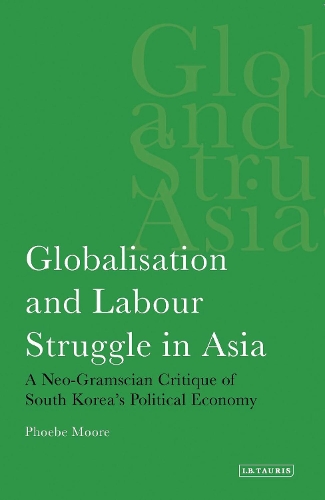
Globalisation and Labour Struggle in Asia: A Neo-Gramscian Critique of South Korea's Political Economy
(Paperback)
Publishing Details
Globalisation and Labour Struggle in Asia: A Neo-Gramscian Critique of South Korea's Political Economy
By (Author) Phoebe Moore
Bloomsbury Publishing PLC
I.B. Tauris
30th October 2012
United Kingdom
Classifications
Tertiary Education
Non Fiction
330.95195
Physical Properties
Paperback
248
Width 138mm, Height 216mm
308g
Description
How has South Korea's development influenced and been influenced by world events What light can it shed on the way that international struggles for hegemony affect local environments Phoebe Moore seeks to address these questions critically, from the perspective of International Political Economics, and so provides important insight into one of the fastest growing Asian economies. Through an original account of Korean development she challenges the neo-Gramscian school theories, observing that all economic development in this country has been carried out through 'passive revolution' driven by an elite, frequently supported by external forces, against the will of a large part of the population. Moore draws out the relationships between socio-economic change, revolution, hegemony struggles and global politics, making this a key resource for Asian political economics, labour relations and international politics.
Reviews
'Phoebe Moore makes a fresh and important contribution to the study of global political economic struggles, deploying an analysis of South Korean labour in relation to capitalist development and globalization, hegemony and passive revolution. This is agency-centred critical International Political Economy at its best, addressing one of the great labour struggles of our time.' Barry Gills, Professor of Global Politics, Newcastle University 'Phoebe Moore has produced here a rich and engaging study of South Korean political economy, which deserves to be read widely. It acts as a useful stimulus towards continued exploration of the social relations and political struggles which underpin and shape contemporary development processes.' Nicola Phillips, Professor of Political Economy, University of Manchester 'In this empirically rich and conceptually innovative book, Phoebe Moore convincingly demonstrates that neo-liberal restructuring in South Korea had not been a hegemonic process, but was constantly contested by workers shaping the outcome. I strongly recommend this book for reading to everyone interested in neo-liberal globalisation and the possibilities of resistance to it.' Andreas Bieler, Professor of Political Economy, University of Nottingham 'In this insightful study, Phoebe Moore astutely theorizes the mechanisms of legitimation of neoliberal capitalism in a particular national context. The work is primarily about vocational education and training (VET), but also provides theoretical discussions of neo-Gramscianism and a brief history of modern Korea. It includes primary research in the form of interviews with policy-makers, implementers and social movement leaders. The study is remarkable in interweaving theoretical concerns with empirical issues, providing a theoretically-informed interpretation of a major tendency in recent events. Of importance is the Gramscian concept of trasformismo, an elite strategy that arises when there is a failure to achieve 'consensus' or hegemony, so the elite ends up resisting the resistance with counter-resistance, aiming for passive revolution. The book is of particular use to scholars on Korea, education policy and/or the mechanisms of neoliberalism, this work is also of interest to anyone seeking to understand the processes of social control and ideological production that surround us today.' Review by Andrew Robinson (University of Nottingham) in Capital and Class
Author Bio
Dr Phoebe Moore is Lecturer in International Relations and International Political Economy in the School of English, Sociology, Politics and Contemporary History at the University of Salford. She is Convenor for the International Political Economy Group, part of the British International Studies Association started in the Royal Institute of International Affairs at Chatham House. She holds a PhD in International Relations from the University of Nottingham.
